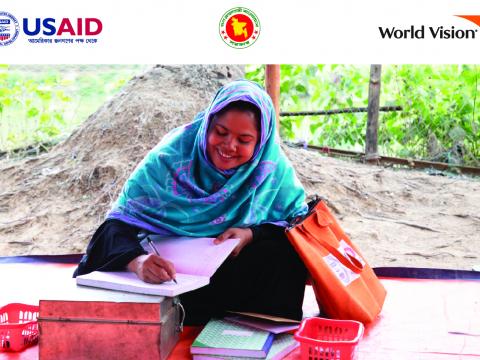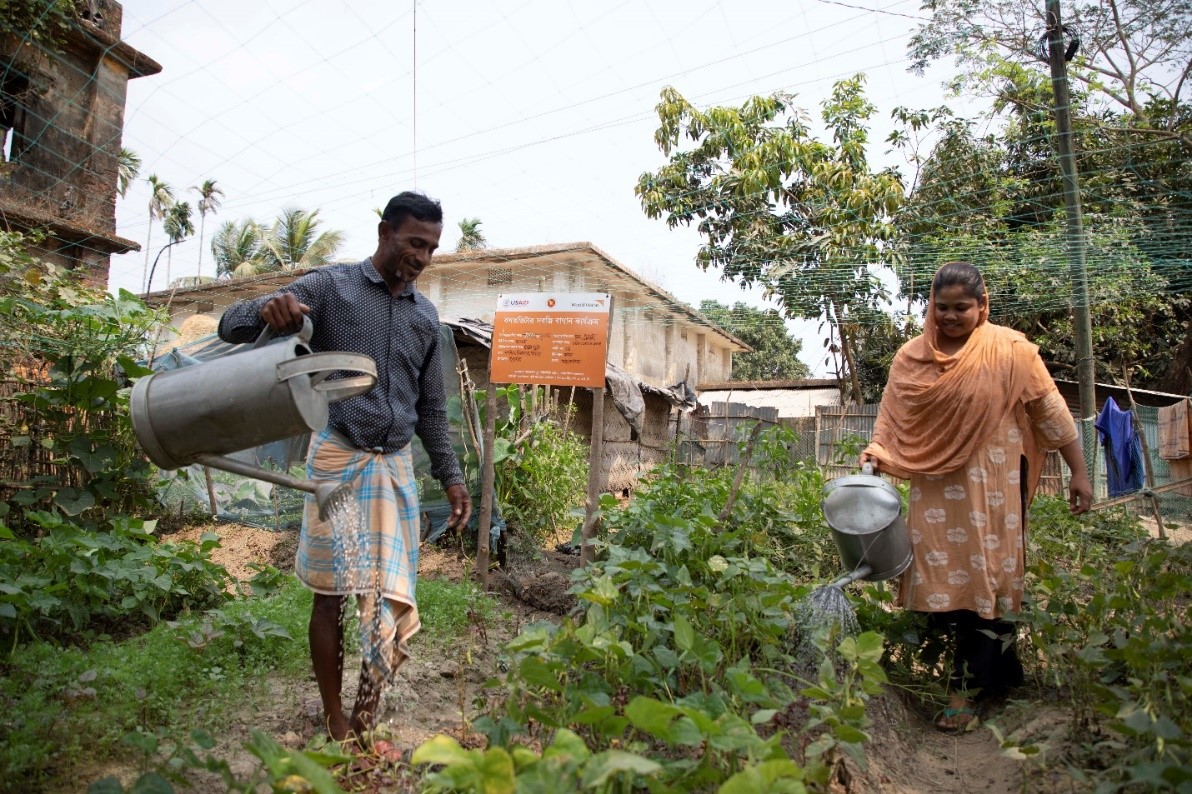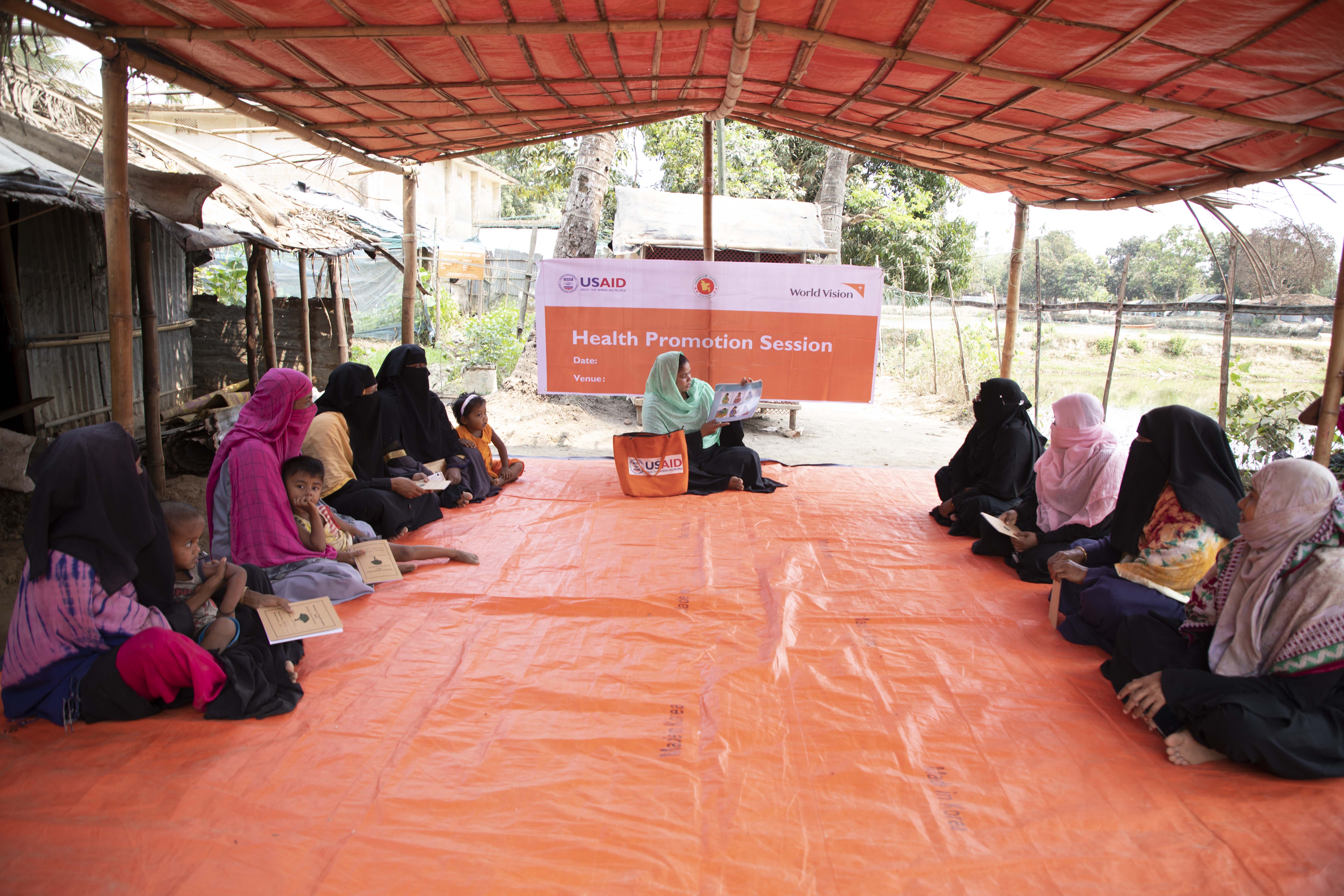Delara - Bringing joy to the hearts of others

"Hunger tormented us everyday. My husband went to catch fish from the river Naf. After 10-12 days fishing in the river he could be able to sell some fish. The days became harder after the Rohingya refugee influx in August 2017," says Delara, a member of the host community in Cox's Bazar.
But now, Delara, the mother of three, can see a ray of hope for her 5-member family. She has strengthened her family economically and became an empowered female leader through the Emergency Food Security Program (EFSP) project.
Things were pretty different earlier. She was a housewife, struggling to care for her three children. Her husband, Jafor, was the only income earner of their family. He was a fisherman in the Naf river, located on the border of Bangladesh and Myanmar. "We couldn't afford medical bills for our children when they were sick," Delara recalls.
Delara's life became even more challenging after the Rohingya refugee influx in August 2017. Fishing, the only source of her husband's income, was prohibited in the Naf river. They had no land for cultivation or other opportunities. So, with a minimum wage by day labouring, they had to maintain their family and pay tuition fees for their children. They had no savings and sometimes needed to borrow money for health needs.
In September 2019, USAID's Emergency Food Security Program (EFSP), implemented by World Vision Bangladesh, was launched to meet the immediate life-saving food assistance needs of 5,229 most vulnerable households. Delara and her family were eligible to participate in the project after a wealth ranking process. They were selected to participate in five of the project's interventions: livelihoods, business development (income generating activity & savings for transformation), Cash for Work, nutrition assistance, and male engagement.
Delara and her husband received seven cash transfers of US$511.47 (BDT43,250) as part of these interventions. The cash transfer included three months of COVID-19 unconditional cash support and four conditional transfers for participating in Cash for Work activities (for helping rehabilitate roads, drainages, and re-excavation of a canal identified as a priority by the community). They also received seasonal vegetable seeds, irrigation support for vegetable production, a bamboo basket, a hand spray machine for biological disease and pest control, a fencing net, etc. They participated in capacity-building training on homestead vegetable gardening and learned how to make the most of their growing garden. The vegetables produced in the garden are helping her meet the family's nutritional needs. She has sold more than US$60 (BDT 5,000) worth of vegetables and has extended her cultivation in nearby areas. She collected seeds from her garden and has preserved those for the next season's cultivation, providing sustainability for the future.

Delara participated in training on indigenous chicken rearing and developed a business plan. Based on her plan, she received USD 180 and purchased 13 chickens, one chicken shed medicine, and a feed and water pot. She constructed the chicken shed inside her home to protect her from thieves. Now she has more than 13 chickens and is getting eggs every day. She has made US$41 (BDT 3,500) since she started. Children of the family are also now eating eggs in their meals and are receiving proper nutrition.
To help Delara and neighbouring women manage the new income, they formed a savings group together. They became trained on World Vision's Savings for Transformation (S4T) model and financial management. Through a participatory process, she got selected as the president of her group. She and her neighbours now come together regularly to manage their savings and loans. Delara saves US$1.18 (BDT 100) every month and US$0.12 (BDT 10) weekly. She uses these savings for emergencies and encourages others to continue the savings practices. Due to her proactiveness and leadership skills, Delara became a lead mother and began facilitating IYCF (Infant and Young Child Feeding) sessions in her community for pregnant and lactating mothers. In the sessions, she demonstrates how to cook complementary food for children 6-24 months of age, teach good personal hygiene practices, and provide referrals to government health services.

Delara explains, "Earlier we did not know anything about food value of vegetables. After participating in nutrition sessions, we came to know about vitamins in vegetables and their value in child health. Now we eat vegetables which have improved our family's health. As the lead mother, now I teach our neighboring mothers and help them to learn."
Delara and her husband also participated in male engagement sessions to become aware of the impacts of gender-based violence and child marriage and implement positive practices within their family, such as joint decision-making. Delara and her husband now jointly make decisions for the betterment of the family. Delara says, "My husband cooks at home and takes care of children when I participate in Cash for Work programme."
In the community, women used to be kept behind from social activities and economic opportunities. One woman states, "Before World Vision's activities in our community, I felt shy to talk in front of people, but now I am a leader of change in my village."
Delara has inspired women, and together they have all seen many improvements in their daily lives: family financial growth, women's participation in family decision-making and economic opportunities, increased child well-being, and peace in families. Because of her proactiveness, support, cooperation, and leadership capabilities, she is a role model to her community. Numbers of positive changes are there in their community now—but the best one is, the children are now happy and healthy.
This success story is made possible by the generous support of the American people through the United States Agency for International Development (USAID). The contents are the responsibility of World Vision and do not necessarily reflect the views of USAID or the United States Government.